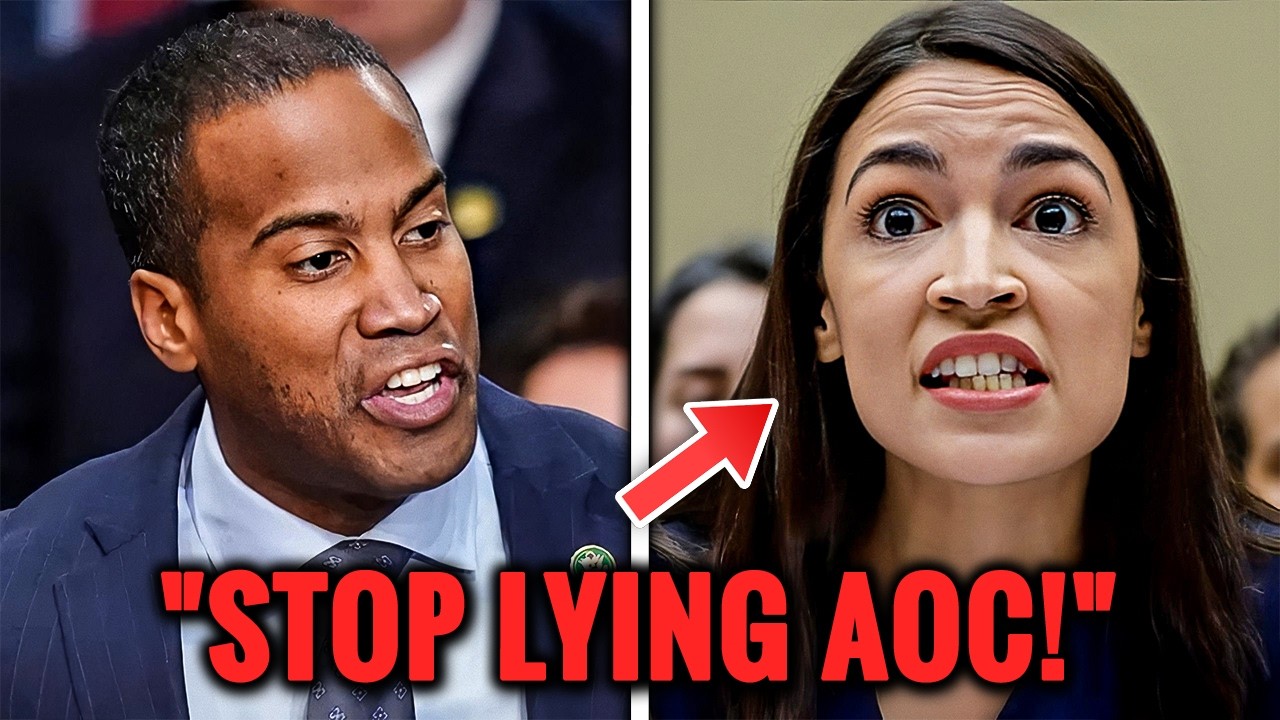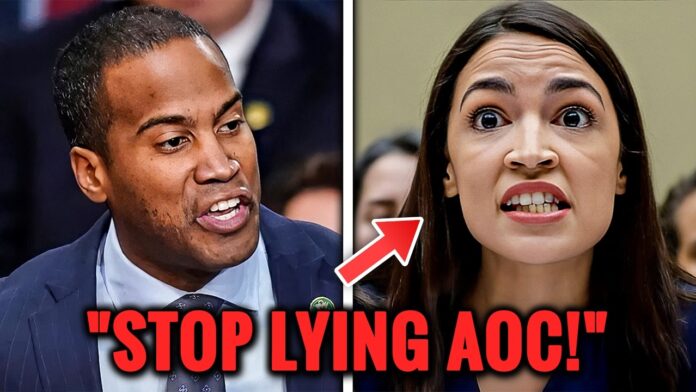🔥 “Just Stop Lying!” – John James DROPS a truth bomb on AOC that left everyone speechless! 😲 Want to know the ONE sentence that shook the internet? You won’t believe what he said… 👀

In the fast-paced world of American politics, where soundbites and viral moments dominate headlines, a single sentence can ignite a firestorm of debate. Recently, John James, a prominent Republican figure, delivered a sharp rebuke to Representative Alexandria Ocasio-Cortez (AOC) with the now-infamous line, “Just Stop Lying.” This moment, captured during a heated exchange, has reverberated across social media platforms, sparking discussions about truth, accountability, and the state of political discourse in the United States. But what led to this confrontation, and why has it struck such a chord with the public? In this article, we delve into the context of the exchange, the implications of James’ statement, and the broader issue of honesty in politics.
The Context of the Clash
The confrontation between John James and AOC reportedly occurred during a public or congressional setting, though specific details about the event remain limited due to the viral nature of the moment overshadowing its origins. John James, a former U.S. Senate candidate and a rising star in the Republican Party, is known for his straightforward, no-nonsense approach to politics. His military background and business experience have shaped his public persona as a pragmatic, results-driven leader who values clarity and accountability. On the other hand, AOC, a leading figure in the progressive wing of the Democratic Party, is celebrated for her passionate advocacy on issues like climate change, healthcare, and economic inequality, but she has also faced criticism for her bold and sometimes polarizing statements.
The phrase “Just Stop Lying” emerged as a direct challenge to AOC, though the exact statement or policy it addressed remains a subject of speculation. Some sources suggest it was tied to a policy debate, possibly related to economic proposals or social justice issues, where James felt AOC’s rhetoric was misleading or exaggerated. Without a verifiable primary source, we can only infer that the exchange was rooted in a disagreement over facts or their interpretation. What’s clear is that James’ words were designed to cut through the noise, delivering a blunt call for truth that resonated with audiences frustrated by political spin.
Why the Moment Went Viral
The viral nature of James’ statement lies in its simplicity and emotional weight. In an era where political discourse is often mired in complexity, half-truths, and carefully crafted narratives, a direct accusation like “Just Stop Lying” feels raw and refreshing. It taps into a widespread sentiment among voters: a desire for authenticity in a landscape where trust in politicians is at historic lows. According to a 2023 Gallup poll, only 17% of Americans expressed confidence in Congress, reflecting deep skepticism about political leaders’ honesty.
The phrase also gained traction because it targeted AOC, a polarizing figure who elicits strong reactions from both supporters and critics. Her ability to command attention through social media and her unapologetic advocacy make her a lightning rod for controversy. When James, a figure less known for theatricality, called her out, it created a perfect storm for viral content: a clash of personalities, a memorable soundbite, and a universal theme of truth versus deception.
The Broader Issue of Honesty in Politics
James’ accusation raises a critical question: how pervasive is dishonesty in modern politics, and what are its consequences? Lying, or at least the perception of it, has long been a feature of political life. From small exaggerations to outright falsehoods, politicians across the spectrum have been accused of bending the truth to suit their agendas. But the digital age has amplified the stakes. Social media platforms like X allow misinformation to spread rapidly, while fact-checking struggles to keep pace. A 2021 study by the University of Southern California found that false information spreads six times faster than accurate information online, underscoring the challenge of maintaining truth in public discourse.
Lying in politics can take many forms, from outright fabrications to omissions or exaggerations. According to research from Psychology Today, people often lie to protect their self-image, avoid conflict, or gain an advantage, and politicians are no exception. In AOC’s case, critics have accused her of exaggerating claims about policy impacts or personal experiences to bolster her narrative, though her supporters argue she’s merely using rhetorical flourish to highlight systemic issues. James, by contrast, has positioned himself as a truth-teller, leveraging his military and business credentials to project integrity.
The consequences of perceived dishonesty are profound. When trust erodes, so does the ability to govern effectively. Voters become cynical, disengaged, or polarized, as seen in the growing divide between progressive and conservative factions. A 2019 study in the Journal of Social and Personal Relationships found that 70% of individuals admit to telling significant lies in relationships, suggesting that dishonesty is a human tendency that politics amplifies. For politicians like AOC or James, every statement is scrutinized, and a single misstep can fuel accusations of deceit.
Analyzing the Impact of “Just Stop Lying”
James’ choice of words was strategic. By framing AOC’s statements as lies, he not only challenged her credibility but also tapped into a broader cultural frustration. The phrase is both an accusation and a plea, implying that honesty is a simple solution to political dysfunction. Yet, it also risks oversimplifying complex issues. Political debates often involve competing interpretations of data, not just clear-cut truths or lies. For example, disagreements over economic policies like the Green New Deal, which AOC champions, hinge on projections and values, not just facts. Calling something a “lie” can shut down dialogue rather than foster it.
On the other hand, the directness of James’ statement resonates with those who feel politicians dodge accountability. The phrase aligns with a psychological concept known as “moral self-image,” where individuals justify dishonest behavior to maintain a positive view of themselves. By publicly calling out AOC, James positioned himself as a defender of truth, potentially bolstering his own moral image among supporters. However, this approach can backfire if perceived as performative or hypocritical, especially if James himself is later accused of misrepresenting facts.
The Role of Social Media in Amplifying the Moment
Social media, particularly platforms like X, played a pivotal role in amplifying this moment. The hashtag #JustStopLying trended briefly, with users sharing clips, memes, and commentary. Supporters of James praised his boldness, while AOC’s defenders accused him of grandstanding or mischaracterizing her statements. This polarization reflects a broader trend: social media rewards outrage and simplicity over nuance. A 2020 study by MIT found that emotionally charged content, especially anger-inducing posts, drives higher engagement online, explaining why James’ confrontational soundbite spread like wildfire.
The viral moment also highlights the double-edged sword of social media in politics. While it democratizes discourse, it can distort context. Without a full transcript or video of the exchange, many people reacted to the quote in isolation, filling in the blanks with their biases. This underscores the need for media literacy among voters, as well as the responsibility of public figures to provide clarity rather than fuel division.
Moving Toward a More Honest Political Future
So, how can politicians and the public move toward a more honest discourse? First, leaders like James and AOC must model transparency. This means acknowledging uncertainties in policy proposals, citing verifiable data, and admitting mistakes when they occur. Research from Verywell Mind suggests that breaking the habit of lying starts with self-awareness and accountability, principles that apply to public figures as much as individuals.
Second, voters must demand higher standards. Fact-checking resources like PolitiFact or independent journalism can help, but individuals must also critically evaluate sources. The USC study on misinformation highlights the importance of slowing down the spread of unverified claims, which requires collective effort. Finally, fostering dialogue over confrontation is key. James’ statement, while impactful, risks escalating partisan divides. A more constructive approach might involve calling for clarity rather than accusing others of deceit.
Conclusion
The “Just Stop Lying” moment between John James and AOC encapsulates the tensions of modern political discourse: a hunger for truth, frustration with spin, and the amplifying power of social media. While the specifics of their exchange remain murky, its impact reveals a deeper truth about public sentiment. People are tired of perceived dishonesty, and moments like this resonate because they promise accountability, even if they risk oversimplification.
As we navigate an era of polarized politics, the challenge is to balance passion with precision, holding leaders accountable without reducing complex issues to viral soundbites. Whether James’ words will spark meaningful change or simply fuel more division remains to be seen. For now, they serve as a reminder that truth is both a weapon and a goal in the fight for a better political future.
